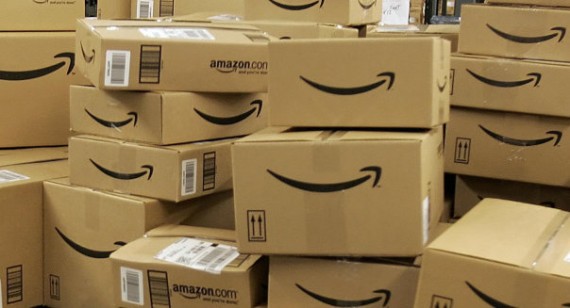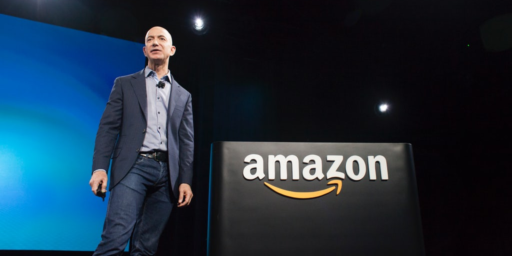Amazon as Non-Profit
Does it matter if companies make a profit?
Matt Yglesias is fascinated by Amazon, which he once described as “a charitable organization being run by elements of the investment community for the benefit of consumer.” He notes that, after almost two decades as a company, during which it has grown from an online bookstore to a goliath that sells just about everything, it manages to be simultaneously lionized by Wall Street and yet make almost no profit.
E-commerce was king this past holiday season, with Christmas surge orders overwhelming UPS’s systems and forcing $100 million in upgrades to prevent future fiascos. So it was no surprise on Jan. 30 when Amazon reported it had become even more enormous than ever before. According to its latest earnings report, the online shopping giant’s net sales increased 20 percent compared with the previous holiday season—a number that would seem staggeringly high if it weren’t so routine for a company that’s been growing rapidly for years. Yet the company’s net income of $274 million for all of last year was tiny relative to its sales of $74.45 billion. Amazon’s profit margin was virtually nonexistent.
Meager as last year’s profits were, they represented a small improvement from 2012, when Amazon actually lost money. Even with the slight uptick in 2013, Amazon earned substantially less profit than it did back in 2008, when it posted a net income of $645 million on relatively modest sales of $19.17 billion. Over the past five years, in other words, the retailer of the future managed to more than triple its sales while slicing profits by more than half. It’s a business success story like no other in the world.
The piece is, by Slate standards, a long read, taking up three pages. And it’s really a fascinating take on the company and its unique position in the marketplace. And, no, I don’t think it’s motivated by the fact that Bezos is, for the time being, Yglesias’ boss, having bought the Washington Post Company, which owns Slate, last August.
But, aside from the things which interest Yglesias, the piece brings to mind something he doesn’t mention that has long fascinated me: the odd way in which we define “profit.”
Jeff Bezos is, after all, the man who just bought the Washington Post Company out of petty cash. Bloomberg ranks him as the 15th richest man on the planet, worth some $32.5 billion. Even after two decades of hard work building Amazon into the world’s largest retailer, that’s not a bad living.
Many successful companies that are organized as non-profits, including those we think of as charities, pay their senior executives princely sums. Organizations you’ve never heard of pay the guys at the top more than the $400,000 annual salary of the president of the United States.
At the end of the day, then, does it really matter if a company makes a “profit” if its founder has gotten rich, its senior executives are making lavish salaries, and its work force are all making comfortable wages?






Translation: Once again, Slate takes a piece that could fit on a single web page and stretches it out over three to increase ad revenues.
Amazon is a predator. It’s not out there to increase the size of the animal herd, it wants, and needs, to reduce the herd. Reduce it to just one creature, if possible: Amazon.
It is very, very good at its job. No one else makes buying anything as easy. But Amazon’s end game — the reason investors stick with it — is complete domination of online retailing. Not just in books, in everything. And when it has crushed all opposition, what happens to their low prices? The investor community is betting on monopoly.
More seriously, I have to question the premise of Yglesias’s piece. It certainly isn’t true that Amazon has never made a profit, if that were the case, it’s stock price would have increased in the manner that it has since 1997. Indeed, i recall many reporting periods during which the company reported a profit.
The difference, I think, is that Bezos has long had a history of being willing to take short term losses if it translates into long term gains. This was certainly true of the company in the beginning, when Amazon was reportedly losing money on nearly every book purchase that was made. I think it’s really matter of him having a longer term view than is often typical of American CEOs.
1-) A company must have profits if it wants to have investors,.
2-) Amazon is not a non-profit. Amazon is a company that uses a large portion of it´s profits to make investments, and investors are expecting these investments to make profits in the future. Amazon would be highly profitable if they stopped investments.
3-) I miss the old days when Yglesias used to write about politics, not about economics.
@michael reynolds:
I’m inclined to agree but I have Amazon Prime and nearly everything I buy online is from Amazon because I can’t afford not to. I have reached the point where I do more streaming from Amazon than I do from Netflix. So yes Amazon is a predator but a very good one.
Andre beat me to it, but I’m pretty sure Yglesias is reading the “no profits” wrong. Most of Amazon’s lines of business probably are profitable, it’s just that they’re spending so much on investment and development that it’s cancelled out. If they want to become openly profitable, Bezos just needs to scale back spending.
Matt does have a point about it keeping Amazon from piling up a pile of cash that might attract private equity raiders.
@michael reynolds:
But Amazon pales in comparison to my dad’s stories of the awesome power of Sears and Roebuck. They would acquire and then serially bankrupt suppliers to maximize return.
1. Businesses must make a profit.
2. I don’t know enough to judge the profitability of Amazon, though I do know enough of MattY to judge he’s likely getting something wrong in his piece, but anyone who thinks Amazon MUST be successful because it’s stock price has gone up or that such “success” is sustainable because Wall Street says so, wasn’t paying much attention to the business world for the last 15 years.
Mike
“At the end of the day, then, does it really matter if a company makes a “profit” if its founder has gotten rich, its senior executives are making lavish salaries, and it’s work force are all making comfortable wages?”
I think you are leaving someone out here (hint, the people who actually own the company). Doug’s point about the stock price rising over time is relevant.
I’m always astounded when I hear this. Yes, compared to, let’s say Barnes & Nobels it’s kind of ok, but why is every Webdesigner and IT guy I know vexing poetic about it?
Yeah, it could be worse but in truth it’s an unintuitive, cluttered mess with different user guidance behaviours on each page. Compared to pages like Good old Games or Qwertee it’s an UI nightmare I would rather avoid but frequently can’t.
@Doug Mataconis: “Translation: Once again, Slate takes a piece that could fit on a single web page and stretches it out over three to increase ad revenues.”
Whereas the come-ons to see pictures of Stacy Keibler and the hot celebrities with real bodies are on these pages entirely as a public service…
Snark aside, it’s good to have you back here, Doug. With no respect to James or the other very talented writers here, you have become over the last year or so the heart and soul of this place, and your absence was felt strongly.
@michael reynolds: “Amazon is a predator.”
Could be. On the other hand, I’ve been published by them and I’ve been published by Penguin, and of the two only Amazon treats its writers as partners, not nuisances (I don’t sell as many books as you do…), issues contracts that are short, clear and honest, issues royalty statements that are absolutely transparent, and actually works to market their books, even those not be best-selling writers.
Maybe they’re a predator. Or maybe they’re just better at what they do…
I have no problem with companies that pass the tax burden on to its employees….with the exception being capital needed for re-investment…..which can also be a tax deduction in most cases…..
@Ebenezer_Arvigenius: Funny you should mention that. I have received a number of Amazon gift card credits since I moved to Korea and last year, I thought that it might be nice to surprise one of my friends who was getting chemo by buying him something that I knew he wanted and that Amazon had.
Things worked out well until I got to check out-where I was told that because I had bought something from Amazon 14 years ago, I needed to log in my member account number and password. If for some reason (such as not having done business with the company for over a decade) I needed assistance with this problem, I could call Amazon at their local Seattle number between the hours of 9 am and 5 pm PST.
“Easy” is not a word that comes to mind for me readily when talking about Amazon. Oh, did I mention that at the time I was pursuing this particular transaction Amazon directed me to its Japanese website–which doesn’t appear to have an English Language version–for deliveries to Korea (I was considering getting some books for myself also).
Dunno if their work force are making comfortable wages, James. Lots of reports of their warehouse workers being subject to abusive conditions.